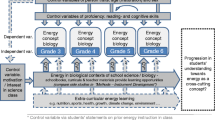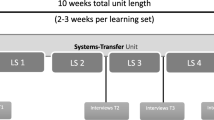Abstract
Energy is recognized as a core idea in science and, hence, a significant learning objective of science education. The effective promotion of this learning objective posits that teachers themselves possess sound conceptual understanding. This is needed for enabling them to organize effective learning environments for their students. In this study, we report on the results of an empirical investigation of teachers’ understanding of energy. In particular, the focus is placed on pre-service teachers’ ability to employ energy as a framework for analyzing the operation of physical systems. We have collected data from 198 pre-service teachers through three open-ended tasks that involved the application of the energy conservation principle to simple physical systems. The results corroborate the claim made in the literature that teachers typically do not possess functional, coherent understanding of this principle. Most importantly, the data serve to identify and document specific difficulties that hamper attempts to use energy for the analysis of the operation of physical systems. The difficulties we were able to document lend support to the idea that it is important to introduce the idea of energy degradation alongside the conservation of energy principle. The findings of this study have implications for the design of preparation programs for teachers, about energy. The findings also provide insights into the limitations of conventional teaching of energy, to which the participants had been exposed as students, in fostering coherent understanding of energy conservation.
Similar content being viewed by others
References
AAAS. (1993). Benchmarks for science literacy. New York: American Association for the Advancement of Science.
Arons, A. (1999). Development of energy concepts in introductory physics courses. American Journal of Physics, 67, 1063–1067.
Burgoon, J. N., Heddle, M. L., & Duran, E. (2010). Re-examining the similarities between teacher and student conceptions about physical science. Journal of Science Teacher Education, 21, 859–872.
Chen, R. F., Eisenkraft, A., Fortus, D., Krajcik, J., Neumann, K., Nordine, J. C., & Scheff, A. (Eds.). (2014). Teaching and learning of energy in K-12 Education. New York: Springer.
Constantinou, C. P., & Papadouris, N. (2012). Teaching and learning about energy in middle school: An argument for an epistemic approach. Studies in Science Education, 48, 161–186.
Driver, R., & Warrington, L. (1985). Students’ use of the principle of energy conservation in problem situations. Physics Education, 20, 171–176.
Duit, R. (1984). Learning the energy concept in school—empirical results from the Philippines and West Germany. Physics Education, 19(2), 59–65.
Duschl, R. Α., Schweingruber, Η. Α., & Shouse, Α. W. (Eds.). (2007). Taking science to school: Learning and teaching science in grades K-8. Washington, DC: National Academies Press.
Field, A. (2005). Discovering statistics using SPSS for window (2nd ed.). London: Sage.
Gess-Newsome, J., & Lederman, N. G. (1995). Biology teachers’ perceptions of subject matter structure and its relationship to classroom practice. Journal of Research in Science Teaching, 32, 301–325.
Harlen, W., & Halroyd, C. (1997). Primary teachers’ understandings of concepts of science: Impact on confidence and teaching. International Journal of Science Education, 19, 93–105.
Hinrichs, R., & Kleinbach, M. (2002). Energy: Its use and the environment. USA: Thomson Learning.
Holton, G., & Brush, G. S. (2001). Physics, the human adventure: From Copernicus to Einstein and beyond (3rd ed.). USA: Rutgers University Press.
Kesidou, S., & Duit, R. (1993). Students’ conceptions of the second law of thermodynamics—An interpretive study. Journal of Research in Science Teaching, 30, 85–106.
Krall, R. M., Lott, K. H., & Wymer, L. C. (2009). Inservice elementary and middle School teachers’ conceptions of photosynthesis and respiration. Journal of Science Teacher Education, 20, 41–55.
Kruger, C. (1990). Some primary teachers’ ideas about energy. Physics Education, 25, 86–91.
Kruger, C., Palacio, D., & Summers, M. (1992). Surveys of English primary teachers’ conceptions of force, energy and materials. Science Education, 76, 339–351.
Liu, X., & McKeough, A. (2005). Developmental growth in students’ concept of energy: Analysis of selected items from TIMSS database. Journal of Research in Science Teaching, 42, 493–517.
Marton, F., & Booth, S. (1997). Learning and awareness. Mahwah, NJ: Lawrence Erlbaum Associates.
McDermott, L. C. (1991). What we teach and what is learned: Closing the gap. American Journal of Physics, 59, 301–315.
McDermott, L. C., Heron, P. R. L., Shaffer, P. S., & Stetzer, M. R. (2006). Improving the preparation of K-12 teachers through physics education research. American Journal of Physics, 74, 763–767.
McDermott, L. C., & Shaffer, P. (1992). Research as a guide for curriculum development: An example from introductory electricity. Part I: Investigation of students understanding. American Journal of Physics, 60, 994–1003.
Millar, R. (2000). Energy. In D. Sang (Ed.), Teaching secondary physics (pp. 1–43). London: John Murray.
National Commission of Science and Mathematics Teaching for the 21st Century. (2000). Before it’s too late: A report to the nation from the national commission on mathematics and science teaching for the 21st century. Washington, DC: U.S. Department of Education.
National Research Council. (2007). Taking science to school: Learning and teaching science in grades K-8. Washington, DC: The National Academies Press.
National Research Council. (2012). A framework for K-12 Science education: Practices, crosscutting concepts, and core ideas. Washington, DC: The National Academies Press.
National Research Council. (2013). Next generation science standards: For states, by states. Washington, DC: The National Academies Press.
Papadouris, N., & Constantinou, C. P. (2011). A philosophically informed teaching proposal on the topic of energy for students aged 11–14. Science and Education, 20, 961–979.
Papageorgiou, G., Stamovlasis, D., & Johnson, P. (2013). Primary teachers’ understanding of four chemical phenomena: Effect of an in-service training course. Journal of Science Teacher Education, 24, 763–787.
Portides, P. D. (2007). The relations between idealization and approximation in scientific model construction. Science & Education, 16, 699–724.
Rice, D. C. (2005). I didn’t know oxygen could boil! What preservice and inservice elementary teachers’ answers to ‘‘simple’’ science questions reveals about their subject matter knowledge. International Journal of Science Education, 27, 1059–1082.
Saderholm, J., & Tretter, T. R. (2008). Identification of the most critical content knowledge base for middle school science teachers. Journal of Science Teacher Education, 19, 269–283.
Shulman, L. (1987). Knowledge and teaching: Foundations of the new reform. Harvard Educational Review, 57, 1–22.
Smith, J. P., diSessa, A. A., & Roschelle, J. (1993). Misconceptions reconceived: A constructivist analysis of knowledge in transition. Journal of the Learning Sciences, 3, 115–163.
Solomon, J. (1985). Teaching the conservation of energy. Physics Education, 20, 165–170.
Solomon, J. (1992). Getting to know about energy: In school and in society. London: Falmer Press.
Summers, M., Kruger, C., Mant, J., & Childs, A. (1998). Developing primary teachers’ understanding of energy efficiency. Educational Research, 40, 311–328.
Tobin, R. G., Crissman, S., Doubler, S., Gallagher, H., Goldstein, G., Lacy, S., & Wagoner, P. (2012). Teaching teachers about energy: Lessons from an inquiry-based workshop for K-8 teachers. Journal of Science Education and Technology, 21, 631–639.
Trumper, R. (1998). A longitudinal study of physics students’ conceptions on energy in pre-service training for high school teachers. Journal of Science Education and Technology, 7, 311–318.
Van Driel, J. H., Verloop, N., & de Vos, W. (1998). Developing science teachers’ pedagogical content knowledge. Journal of Research in Science Teaching, 35, 673–695.
Wandersee, H. H., Mintzes, J. J., & Novak, D. J. (1994). Research on alternative conceptions in science. In D. L. Gabel (Ed.), Handbook on research on science teaching and learning (pp. 177–210). New York: Macmillan.
Wilson, M. (2004). Constructing measures: An item response modeling approach. UK: Lawrence Erlbaum Associates.
Wright, S. P., Horn, S. P., & Sanders, W. L. (1997). Teacher and classroom context effects on student achievement: Implications for teacher evaluation. Journal of Personnel Evaluation in Education, 11, 57–67.
Acknowledgments
The study reported in this paper is part of the Projects EKTEMA and EPIKOITE, which were funded by the Cyprus Research Foundation through the Programs PENEK20/02 and ENISX/0504/15, respectively.
Author information
Authors and Affiliations
Corresponding author
About this article
Cite this article
Papadouris, N., Hadjigeorgiou, A. & Constantinou, C.P. Pre-service Elementary School Teachers’ Ability to Account for the Operation of Simple Physical Systems Using the Energy Conservation Law. J Sci Teacher Educ 25, 911–933 (2014). https://doi.org/10.1007/s10972-014-9407-y
Published:
Issue Date:
DOI: https://doi.org/10.1007/s10972-014-9407-y




